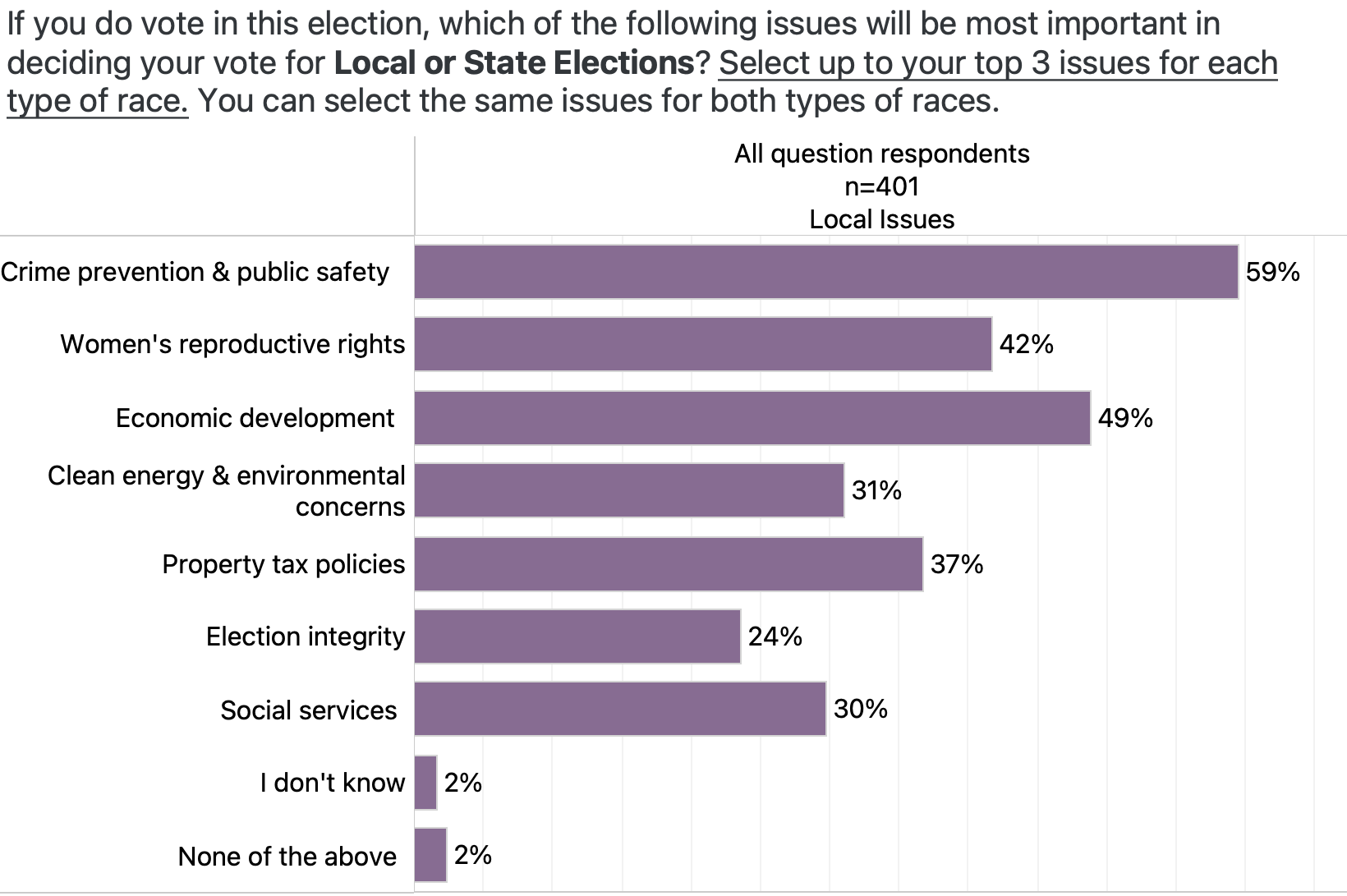Campos and 90.5 WESA, Pittsburgh’s NPR News Station, are partnering on a series of short opinion surveys of adults in the Pittsburgh region to better understand their opinions on a range of timely topics. This joint research and reporting project will ensure WESA can tap into the opinions of people in Pittsburgh on a regular basis and use the corresponding results to complement its reporting. (For more information, or to sign up to participate, click here.)
In the fourth round of the WESA/Campos Pulse Survey, we explored Pittsburgh area residents’ concerns, attitudes, and intentions with regard to the November 2023 local and state election. (The survey was conducted 1-2 weeks before the election.) Below are a few highlights.
Key Findings
Attention to the election was high among Pittsburgh area residents. Nearly all respondents intended to vote, and more than half (52%) had been paying attention to local elections “a good deal” or more, this year.
-
94% of respondents self-identified as registered to vote in PA.
-
Based on self-report, 90% of respondents were at least “somewhat” likely to vote—with 80% “very likely.”
-
76% of respondents reported that they had been paying attention to local elections this year at least “a moderate amount.” More specifically, that included:
-
17% paying attention “completely”
-
35% paying attention “a good deal”
-
24% paying attention “a moderate amount”
-
-
Attention to local elections and likeliness to vote tended to be higher among older age groups and those with higher household incomes.
Crime / public safety and women’s reproductive rights were top issues driving voters’ choices in both state and local elections, though reproductive rights was less important than economic development for local elections.
Percentages below indicate the percent of respondents who marked that item as one of the top 3 issues “most important in deciding your vote for local or state elections.” The issues important for local and for state elections were assessed in 2 separate questions.
-
For local elections, Pittsburgh area residents were most likely to identify “crime prevention & public safety” (59%) as one of the top 3 issues important in deciding their votes.
-
This was followed by “economic development” (49%) and “women’s reproductive rights” (42%).
-

-
For state elections, “women’s reproductive rights” (55%) and “crime prevention & public safety” (52%) were about tied as the issues most frequently deciding people’s votes.
-
The third most-selected issue for state elections was “election integrity” (35%).
-

-
Among registered Democrats, “women’s reproductive rights” was by far the most common issue deciding people’s votes for state elections, and was also the #1 most-selected issue even for local elections.
-
Among registered Republicans, “crime prevention & public safety” was by far the most common issue deciding people’s votes for both state and local elections.
The balance of positive to negative coverage and ads was about equal for Sara Innamorato, Joe Rockey, Matt Dugan, and Stephen Zappala.
-
For each of the 4 candidates we asked about, Pittsburgh area residents overall were about equally likely to have seen positive and negative coverage/ads.
-
Those paying the closest attention to the election (i.e., “completely”) were more likely to report seeing negative than positive coverage/ads regarding Sara Innamorato and Matt Dugan, while the opposite was true of Joe Rockey.
-
Those who were “definitely planning” to vote for a candidate outside of their own political party were particularly likely to have seen negative coverage/ads regarding Sara Innamorato and positive coverage/ads regarding Joe Rockey.
-
Those who were “slightly” to “a great deal” considering voting for a candidate outside of their own political party were particularly likely to have seen positive coverage/ads regarding Stephen Zappala.
-
-
Overall, respondents were more likely not to have seen/heard any coverage or ads pertaining to the candidates who lost their races (Joe Rockey and Matt Dugan) as compared to the candidates who won.
-
Respondents were much less likely to have seen “neutral coverage” of any of the candidates than they were to have seen coverage/ads with a positive or negative bent.
Half of respondents were at least “slightly” considering voting for a candidate outside their registered party in the local/state election. Two-thirds were considering it “a moderate amount” or more.

-
Democrats were more polarized in their responses—they were a bit more likely than Republicans to be “definitely” planning to vote across party lines, but also a bit more likely to be “not at all” considering it. Republicans were more likely to be considering it “a moderate amount.”
-
Those paying closer attention to the election were more likely to be considering voting across party lines.
-
The same trend applies to older and (to a lesser extent) higher-income respondents—both groups that tended to be paying closer attention to the election.
-
Survey Methodology
Fielding dates: October 25-30, 2023
Survey length: 5-8 minutes
Sample: 401 adults (age 18+) in the Pittsburgh region
-
Responses were solicited from the proprietary Campos Research Panel (10,000+ members in the Greater Pittsburgh area). Respondents were offered a chance to win one of five $50 gift cards to incentivize participation.
-
84% of the respondents reside in Allegheny County, and about 16% reside in the adjacent 5 counties (Armstrong, Beaver, Butler, Washington, Westmoreland).
-
The sample was managed and weighted to be approximately representative of the 6-county region by age, gender, and race/ethnicity.
Screening Criteria:
-
Age is 18 or older
-
Resides in Allegheny, Armstrong, Beaver, Butler, Washington, or Westmoreland counties
About the WESA/Campos Pulse Survey: https://www.campos.com/wesa-campos-pulse



